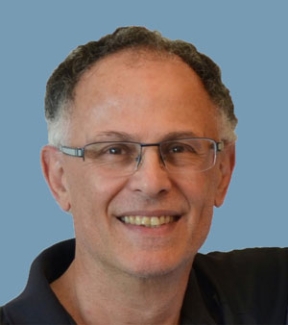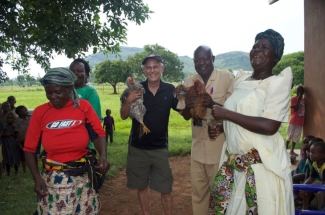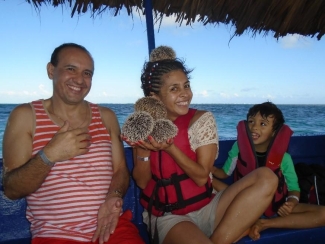This week, we catch up with Dr. Ed Conway, the director of the Centre for Blood Research at the University of British Columbia and a Canadian Blood Services adjunct scientist.
“The challenge of questioning dogma, and of considering ideas that have not been considered before, is great entertainment. Sharing this excitement with students, friends and colleagues who are similarly curious, is inspiration to keep exploring.”
Dr. Ed Conway, Director of the Centre for Blood Research, Canadian Blood Services adjunct scientist
Where do you work and what is your role?
I'm a professor of medicine in the division of hematology-oncology, and the director of the Centre for Blood Research (CBR) at UBC. My research lab is located at the CBR in the Life Sciences Institute (LSI). Trained in Boston as a hematologist-oncologist, I retain a strong interest in pursuing research that is clinically relevant.

Aside from forever writing grant applications to enable my team to pursue our own research endeavours, my role since joining the CBR in 2009 has been to catalyze interactions between clinicians and fundamental scientists, to provide educational and career-enhancing opportunities for trainees at all levels, and to try to help our CBR researchers achieve their goals, by providing whatever resources are available. In all of this, the Canadian Blood Services has been and continues to be a welcoming and crucial partner of mine and of the CBR, with overlapping and complementary objectives.
Learn more about the Centre for Blood Research, its recent accomplishments, and Dr. Conway’s perspective as director in his March 2018: “Notes from Conway’s Chair” blog post.
Tell us about your areas of research
My research interests can be divided neatly into four major areas that appear to be disconnected, but in truth, are linked through science and history. That's my way of saying that I lack focus!
The first is aimed at trying to understand the mechanisms by which blood clotting is controlled, particularly by proteins found in cells lining the blood vessels. The second is to determine how a major blood borne component of innate immunity, the complement system, cross talks with the blood clotting (coagulation) system (they do!). The third is to test the potential use of agents newly discovered in our lab that target the complement system as treatment for age-related macular degeneration, which is one of the world's commonest causes of blindness. And the fourth is to characterize the role of a fat cell (adipocyte) protein in obesity and type 2 diabetes.
If you don't see how these are connected, you're welcome to drop by, and I'll explain! All are driven by a desire to understand mechanisms of disease, in the hopes of identifying much-needed, effective and safe therapies. In all of these projects, we rely on the use of genetically modified mouse models of human disease to test our ideas. And then we collaborate widely — indeed, throughout the world (one of the many fun parts of the job) — to bring the right expertise into the program, and to tap into patient populations to validate our findings. Of course, the work doesn't start to get off the ground without funds from those granting agencies and industry partners, and my team of talented and enthusiastic technicians, students, and postdoctoral fellows!
What expertise/knowledge/experience led you to become a Canadian Blood Services adjunct scientist and how does this influence your work?
From my earliest days in Toronto as a staff hematologist and research scientist, the Canadian Blood Services (and its predecessor) were integral to my clinical practice and to my research. The mainstay of my interests revolved around thrombosis, bleeding disorders, and innate immunity and the role that plasma proteins play in these disorders. Thus, the Canadian Blood Services is a natural fit. Upon arriving at the CBR in 2009, I found myself surrounded by Canadian Blood Services scientists, all involved in research closely aligned with my interests and expertise. I was extended the invitation to join, and I accepted with great appreciation.
Being a Canadian Blood Services adjunct scientist provides me with the unique opportunity to share pursuits with an enthusiastic and talented community of scientists and clinicians throughout Canada, with overlapping interests, but diverse knowledge and skills. This not only creates long-lasting friends (a major bonus) and colleagues, but reveals unique opportunities to collaborate.
Why did you get into science/medicine?
Wow! That's a life-story .... how I came to be where I am! My first love was certainly not medicine. In fact, after giving up on the idea of being an astronaut, I planned on a career as a biomedical engineer. I wanted to create truly practical artificial limbs for kids with physical disabilities, and that's where I started in Toronto. But in those ancient times, when slide rules were in vogue, the term "biomedical engineering" had just been coined, and finances for such exploits were scarce. I saw that the route to my dream might be simpler and more practical (and better-funded) via medical school.
And so, I morphed into a medical doctor, expecting to return to engineering, but along the way, I took several detours. I moved from being a clinical hematologist-oncologist to a basic scientist, and from Boston to Toronto to Belgium, and finally to Vancouver, the CBR and Canadian Blood Services. Although apparently directionless, my "meandering" always seemed to have a reason and a purpose (or so I thought at the time). Everything new had something exciting about it and I wanted more. Of course, I was heavily influenced by enthusiastic mentors and colleagues, and so I landed here, with no regrets of the roads that I've traveled. And of course, many roads lie ahead still ....
What inspires you?
Everything! I'm curious and so I love to explore and to ask "why" and "why not". The challenge of questioning dogma, and of considering ideas that have not been considered before, is great entertainment. Sharing this excitement with students, friends and colleagues who are similarly curious, is inspiration to keep exploring. And hopefully, these efforts will be of real benefit to someone in need.
What work are you most proud of?
From a research point of view, there is one significant and impactful contribution from my team that I believe stands out (and hopefully there will be more!); this is the discovery that the protein, thrombomodulin, which is best known for its important anticoagulant function, contains a region - the so-called lectin-like domain - that has potent anti-inflammatory properties. I was on sabbatical in Belgium, and took a leap, without any inkling of where such a line of research might lead, to see if I could figure out what this region of thrombomodulin does. It had been a puzzle for many years. With a terrific team and spectacular resources, we generated mice that lack that region of thrombomodulin, and then set about to uncover its importance. This was no easy task, as the mice looked entirely normal. But with a little bit (maybe a lot) of luck, we fell upon this unique observation that revealed its protective properties in response to inflammation.
This discovery provided a terrific and unique example of how coagulation and inflammation are fully integrated and coordinated, in this case, all by a single protein. And most satisfying is that this structure of thrombomodulin is being tested as a therapeutic in pre/clinical studies (also in our lab) for various inflammatory diseases.
Learn more about the links between coagulation and inflammation in this 2016 review article by Dr. Conway: “Cross Talk Pathways Between Coagulation and Inflammation”.
When you’re not in the lab where could we find you?
For the last few years, it's Uganda! My wife works there a good part of each year, providing tools for financial literacy to semi-literate vulnerable populations in rural parts of the country, and supporting local NGOs with accounting skills. On my regular visits, I teach hematology and research methods to medical and science trainees at Makerere University in Kampala. I am also an advisor for the Hemophilia Foundation of Uganda, helping them to devise strategies to adequately provide even the most basic services to patients with bleeding disorders... care that we take for granted in Canada. There is lots of low-hanging fruit there, where one can make meaningful contributions, and the rewards are huge.

When not in Uganda and not in the lab, you'll find me hiking with my dog, rooting for the Blue Jays (my home town) and the Cleveland Indians (where one of my sons works), and by far the best, meeting up with my family somewhere in the world!
Subscribe to the Research & Education Round Up to stay up to date on research publications and funding opportunities.
Visit our Funded Research Projects to view projects funded by Canadian Blood Services.
Canadian Blood Services – Driving world-class innovation
Through discovery, development and applied research, Canadian Blood Services drives world-class innovation in blood transfusion, cellular therapy and transplantation—bringing clarity and insight to an increasingly complex healthcare future. Our dedicated research team and extended network of partners engage in exploratory and applied research to create new knowledge, inform and enhance best practices, contribute to the development of new services and technologies, and build capacity through training and collaboration.
The opinions reflected in this post are those of the author and do not necessarily reflect the opinions of Canadian Blood Services nor do they reflect the views of Health Canada or any other funding agency.
Related blog posts
This week, we catch up with Dr. Sandra Ramirez-Arcos, Canadian Blood Services’ development scientist and head of the microbiology laboratory in Ottawa. How long have you been with Canadian Blood Services? I started working at Canadian Blood Services on November 10, 2003, so it will be 15 years in...
